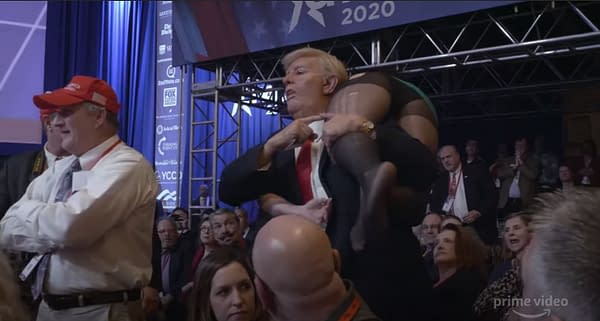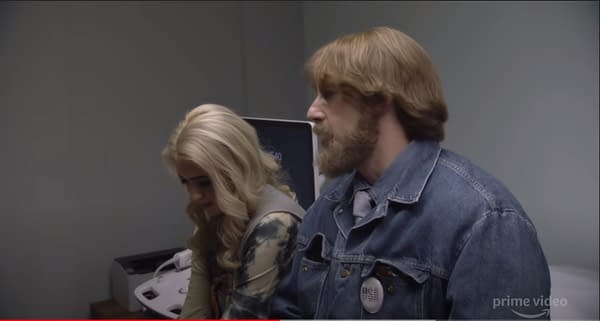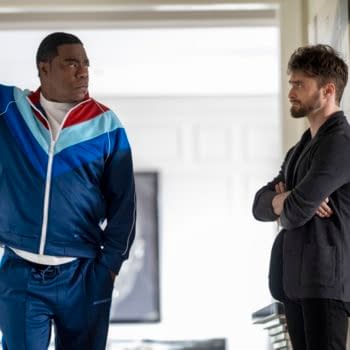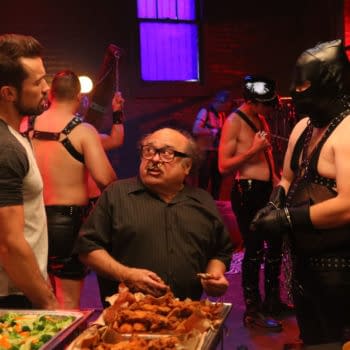Posted in: Amazon, Movies | Tagged: borat, borat 2, Borat Subsequent Moviefilm, Capitol Attack, NPR, sacha baron cohen
Borat: Sacha Baron Cohen on Retiring Character, Ethics, Close Calls
Sacha Baron Cohen shot to superstardom after taking one of his most popular characters to the big screen in Borat Sagiyev, the fictional abrasive bigoted journalist from Kazakhstan in the 2006 film Borat: Cultural Learnings of America for Make Benefit Glorious Nation of Kazakhstan exposing red-state America in the mirror for the purposes of satire. He did it again with another character he also previously created on Da Ali G Show in Bruno in 2009 to lackluster reception. When Donald Trump won the presidency, Cohen revived the character again in Borat Subsequent Moviefilm for Amazon in election season. The actor spoke with NPR about how his fame and recognition prevent him from doing more with the character and his deep undercover nature, rationalizing the ethics when dealing with the subject matter, and what made him decide to quit while he was ahead.

"I felt very clearly from the start of the [Trump] administration that we were heading towards authoritarianism. And so I felt I had to do something," Cohen said. "I was terrified that if Trump got in again, that America would be a democracy in name only." The plot to the 2020 film originally intended to have Borat attempt to have himself an audience with the President with a gift, but ended up with the character trying to "give" his daughter Tutar (Maria Bakalova) away to Vice President Mike Pence. The end result was Cohen going in disguise as a Trump lookalike at CPAC with Tutar on his shoulder confronting Pence during the VP's speech.

The duo did end up having their signature moment in the film with Trump's former lawyer, former New York City mayor Rudy Giuliani. They captured him with Tutar in a compromising situation which Giuliani later claimed was a "mic adjustment." While Cohen's concern was hardly the subsequent lawsuits that followed, it would be the close calls like the one he encountered at a gun-rights rally. "I was wearing a bulletproof vest, and that's only the second time in my career that I've ever done that," he recalled. "But I was told that there was a chance that somebody might try to shoot at me. I was very aware that once the crowd realized that I was a fake, that it could turn really ugly, and it could be really dangerous. … I remember putting on the bulletproof vest before the scene, looking in the mirror of a nearby hotel, and … I remember asking the makeup guy, 'Do you think I'm going to get shot today?' And he's like, 'No, no, no, no.' I said, 'Well, why am I putting on the bulletproof vest then?' And he didn't really have an answer."

It was then when Cohen reached an epiphany. "I kept on coming back to this feeling," he continued. "Again, I didn't want to do Borat again. I didn't want to go undercover again. I felt I had to do anything I could to remind people of what, in 90 minutes, in a humorous way, of what Trump had done the prior four years, and I felt I had to try and infiltrate his inner circle, which we did do with Rudy Giuliani and Mike Pence. We felt we had to do that. I felt I had to get this movie out before the election. But, yes, maybe I'm crazy." When it came to approaching his subjects, the actor asked himself a series of questions to justify confronting them.
"Those are the discussions that we have in the writers' room continually: Is this ethical? What's the purpose of this scene?" Cohen said. "Is it just to be funny? Is there some satire? Is that satire worth it? When you're doing stuff like a gun rally, and you could get shot, then morally, it's very clear. Or if you're undermining one of Trump's inner circle, whose sole aim is to undermine the legitimacy of the election, then, yeah, that's moral. I mean, look at what Rudy did post-Borat coming out. He spread this big lie that Trump had won the election. And that lie is so dangerous and so misleading that it led to the attack on the Capitol — and it hasn't ended." The actor continued rationalizing how the ends justified the means given the Trump administration. There were two unwitting subjects in the sequel which had their own issues with the film's gonzo style but weren't specific targets of Cohen's commentary in Jeanise Jones, who spoke to Bleeding Cool about her experience since the film and the estate of Holocaust survivor Judith Dim Evans, who sought litigation against Cohen and company.
For more on Cohen talking about his preference to give interviews in character and his Netflix film The Trial of the Chicago 7, you can head to NPR. Borat Subsequent Moviefilm is available to stream on Prime Video.















